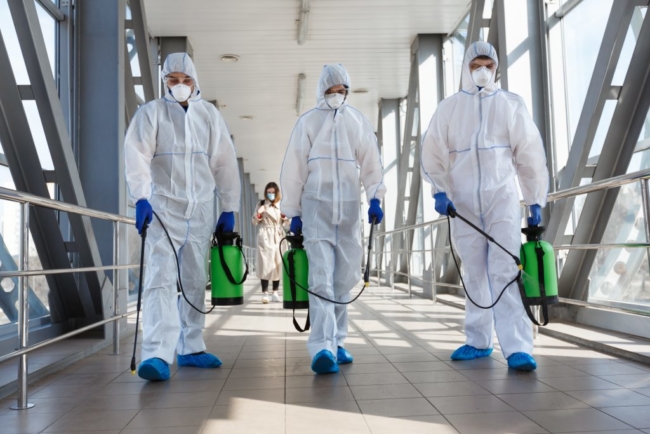Tips for cleanliness and hygiene on your travels during coronavirus
Links on Head for Points may support the site by paying a commission. See here for all partner links.
Christian Harris, a long-term HfP reader, runs a decontamination cleaning business. He offered to write a few thoughts on what you should look out for when travelling at the moment, either by plane, bus or train. Over to Christian ….
When the world is on hygiene lockdown, it’s hardly a surprise that cleanliness has become a hot topic. Analysis of the Twitter feed of one gym chain showed a 3,900% increase in tweets regarding cleanliness and hygiene in the two weeks leading up to the UK lockdown!
Whilst cleanliness on British Airways planes, in particular, has always been point of vigorous discussion on Head for Points, now more than ever this takes on critical importance.
Who you gonna call?
You’ve probably all seen people dressed up in what one of my safety industry friends called “Ghost Busters” outfits, which is showing the industrial side of hygiene, but what exactly are they doing?

Why are some companies doing this and others are “only” vigorously wiping down surfaces?
Unfortunately, there is a lot of misinformation out there on this topic, which is a bit worrying if you think about it! Generalist cleaning companies, who, in my experience, often cannot do rudimentary daily cleaning that well, are offering “decontamination” services; there are specialist contractors who seem to be only doing sanitisation.
So, let’s try to give some clarity for you as an individual so you can best protect yourself.
Clean vs sanitised vs disinfected
Firstly, you should know that there is a difference between cleaning, sanitising and disinfection.
Cleaning is the removal of soiling, whether visible of invisible, from a surface
Sanitising is the reduction of bacteria and germs
Disinfection is the removal of bacteria and germs
You can sanitise a surface without necessarily cleaning it first, or indeed you can have one product or process which does both (e.g. your Dettol spray at home). But you cannot disinfect without thoroughly cleaning first, so not every all-in-one process will necessarily work.
Even after disinfection, the next time a surface is used it could have germs on it again
It is possible to leave a residual effect on a surface following disinfection which repels any germs, keeping them airborne where they will swiftly die out (we are doing this in lots of buildings once per week right now). However, if that surface gets soiled or has too much abrasion on it, it can become a landing place for bacteria again.
Many disinfection processes do not even leave that residual effect, so as soon as the first person with the virus on their hands touches a door handle, that is contaminated.
Disinfection is not a one-and-done; you need constant maintenance. Do not assume that a clean looking surface has no germs on it.
What should you do, practically, to reduce risk to yourself and others when travelling?
I’m at home shielding my youngest who has asthma, but if I were travelling anywhere, I would take my own spray or pack of wipes with me. I would be cleaning and then disinfecting any surfaces before I touched them – door handles, coffee cups, taps – you name it.
It’s important to do a double process because surfaces can be dirty but with invisible contamination. You want to physically clean this off the surface first and then disinfect.
Note that if you have alcohol-based wipes, the alcohol will almost certainly be used up cleaning the surface. You will have nothing left to kill germs – you definitely need a double process, which means using a second wipe for the final polish.
You could buy something like Milton Antibacterial Surface Spray and / or Milton Milton Anti-Bacterial Surface Wipes for this. I can vouch for these on a personal level as someone with two kids under 6.
So use one spray and then one wipe, or two wipes may be easiest.
Naomi Campbell was on to something, basically, with her infamous pre-flight seat cleaning regime.
Are planes / trains / coaches / tube carriages being cleaned and disinfected?
Without looking at exactly what is being done by an individual operator, it’s impossible to say. I strongly suspect all transport operators are doing more to try to clean, sanitise or disinfect, but the devil is in the detail as mentioned above.
As such, I would be very vigilant about any surfaces that I was going to touch.
Wash your hands and don’t touch your face
Interestingly, cases of Norovirus are dramatically down this year because people clearly are washing their hands more than they would have done before. Hopefully we can all stick to this higher level of hygiene when the world returns to normal.
Christian Harris is the founder of Decontamination Cleaning UK and Slip Safety Services. Until December 2019 he was a BA Gold card holder but has now, much to his chagrin, been demoted to Silver.









Comments (61)